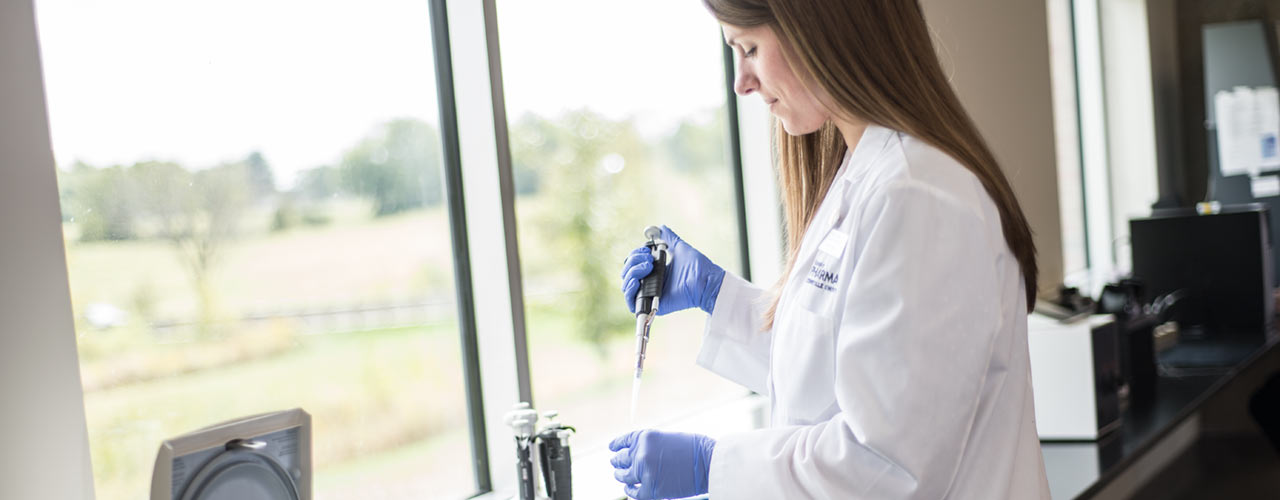by Clem Boyd, Communications Content Manager
Health care in America just received a shot in the arm that’s in time and online.
The Cedarville University School of Pharmacy opened the Center for Pharmacy Innovation January 1, 2018. The new center got off the ground with initial funding of $250,000 from Dublin, Ohio, husband and wife pharmacists Dave and Phyllis Grauer. Starting March 1, the center’s knowledge and expertise will be available online at cedarville.edu/Center-for-Pharmacy-Innovation.
Dr. Marc Sweeney, dean of the Cedarville University School of Pharmacy, believes the Grauers’ contribution will spur others to financially support the new center. “With the Grauers’ gift, we hope to attract additional donors who will commit to fostering innovation in pharmacy and health care,” he said.
Dr. Justin Cole, Cedarville University assistant professor of pharmacy practice, has been named the director of the center. Cole formerly served as coordinator for clinical and investigational drug services at Nationwide Children’s Hospital in Columbus, Ohio.
“We want to advance the role of pharmacists as part of the health care team,” noted Cole. “We also want to identify solutions to improve patient care.”
He will work to attract innovators and funding for pilot projects to address issues such as medication nonadherence, rising drug and health care costs, appropriate integration of technology and new drug discovery. The center will collaborate with the Ohio Pharmacists Association, among others, to develop creative solutions to health care issues.
“We may be finding ways to deploy pharmacists to tackle unique problems in health care, like the opioid crisis,” Cole said, “or expanding the role of pharmacists in clinics, where they could manage medical conditions they’ve not had the opportunity to manage before. Pharmacists are the most underutilized members of the American health care system, as far as their training goes.”
An example is Cedarville's Dr. Melody Hartzler, associate professor of pharmacy practice. She serves in a family practice office managing the care of diabetic, COPD and other chronically ill patients, which include prescribing medicines and ordering labs. She can function this way because of Ohio House Bill 188, which permits pharmacists to enter consult agreements with physicians.
“We want to help professional pharmacists look for and identify areas in health care where they can play a key role in improving outcomes and reducing costs,” Sweeney affirmed. “Not only are the president and Congress trying to address those issues, but solutions need to come from within the health care system as well.”
Traditionally, pharmacists have dispensed and monitored medications based on a physician’s prescription. “We’re not trying to create new roles in the dispensing process,” said Dave Grauer, an attorney and pharmacist. “But we can help create opportunities for pharmacists to use their drug and cognitive knowledge to further health care quality and efficiency.”
The Grauers cited an example from Phyllis Grauer’s pharmacist-based consulting service to hospice organizations. “At that point in 1999, physicians dispensed brand-name drugs for hospice care and tended not to look at drug therapy costs,” she explained. “We worked with hospice agencies to reduce medication costs, but also to help nurses become more knowledgeable about presenting recommendations to physicians.”
“Pharmacists can do more with their drug knowledge and communication skills as a member of a team of health care professionals to help implement innovative health care delivery,” Dave Grauer said.
For Cole, the establishment and work of the center is a God-given responsibility. “We want to help people live life to the fullest, in the way God intended them to live,” he explained. “Doctors, nurses and pharmacists are in the business of improving the quality of people’s health, but they’re limited by the resources they have. We want to leverage the resources and the knowledge of our faculty and students to give those health care providers new tools to help them serve patients more effectively.”
Located in southwest Ohio, Cedarville University is an accredited, Christ-centered, Baptist institution with an enrollment of 3,963 undergraduate, graduate, and online students in more than 150 areas of study. Founded in 1887, Cedarville is recognized nationally for its authentic Christian community, rigorous academic programs, strong graduation and retention rates, accredited professional and health science offerings, and leading student satisfaction ratings. For more information about the University, visit www.cedarville.edu.


















